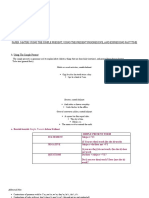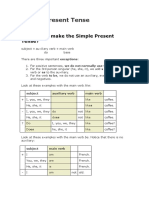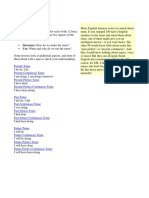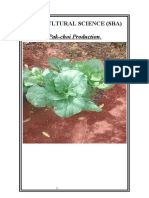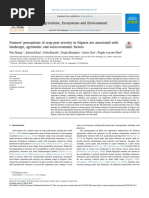Present Simple Explanation and Exercises
Present Simple Explanation and Exercises
Uploaded by
assaf.binhasCopyright:
Available Formats
Present Simple Explanation and Exercises
Present Simple Explanation and Exercises
Uploaded by
assaf.binhasOriginal Title
Copyright
Available Formats
Share this document
Did you find this document useful?
Is this content inappropriate?
Copyright:
Available Formats
Present Simple Explanation and Exercises
Present Simple Explanation and Exercises
Uploaded by
assaf.binhasCopyright:
Available Formats
E .Y .
Simple Present Tense
I sing
How do we make the Simple Present Tense?
subject + auxiliary verb + main verb
do base
There are three important exceptions:
1. For positive sentences, we do not normally use the auxiliary.
2. For the 3rd person singular (he, she, it), we add s to the main verb or es to the
auxiliary.
3. For the verb to be, we do not use an auxiliary, even for questions and
negatives.
Look at these examples with the main verb like:
subject auxiliary verb main verb
+ I, you, we, they like coffee.
He, she, it likes coffee.
- I, you, we, they do not like coffee.
He, she, it does not like coffee.
? Do I, you, we, they like coffee?
Does he, she, it like coffee?
EnglishYourWay Study Centre
E .Y .W
Look at these examples with the main verb be. Notice that there is no auxiliary:
subject main verb
+ I am French.
You, we, they are French.
He, she, it is French.
- I am not old.
You, we, they are not old.
He, she, it is not old.
? Am I late?
Are you, we, they late?
Is he, she, it late?
How do we use the Simple Present Tense?
We use the simple present tense when:
the action is general
the action happens all the time, or habitually, in the past, present and future
the action is not only happening now
the statement is always true
John drives a taxi.
past present future
It is John's job to drive a taxi. He does it every day. Past, present and future.
EnglishYourWay Study Centre
E .Y .W
Look at these examples:
I live in New York.
The Moon goes round the Earth.
John drives a taxi.
He does not drive a bus.
We do not work at night.
Do you play football?
Note that with the verb to be, we can also use the simple present tense for situations
that are not general. We can use the simple present tense to talk about now. Look at
these examples of the verb "to be" in the simple present tense - some of them are
general, some of them are now:
Am I right?
Tara is not at home.
You are happy.
past present future
The situation is now.
I am not fat.
Why are you so beautiful?
Ram is tall.
past present future
The situation is general. Past, present and future.
This page shows the use of the simple present
tense to talk about general events. But note
EnglishYourWay Study Centre
E .Y .W
that there are some other uses for the simple
present tense, for example in conditional or if
sentences, or to talk about the future. You
will learn about those later.
English
Let's talk about tenses.
By CARL ROGERS
How do we use the simple present tense?
We use the simple present tense when:
The action is general פעולה כללית
The action happens all the time, or habitually, in the past, present and future פעולה
שבשגרה
The action is not only happening now פעולה שלא מתרחשת רק עכשיו
The statement is always true ההצהרה תמיד נכונה/המשפט
Exercise 1 - complete the sentence with the correct word.
1. I _am_ here. (am/is/are)
2. She _is_ happy. (am/is/are)
3. We _play_ basketball in the afternoons. (play/plays)
4. The girl always _sings_ in the shower. (sing/sings)
5. The baker _bakes_ bread every morning. (bakes/bake)
6. Our company _gives_ presents to its employees. (give/gives)
7. My daughter _jumps_ rope with her friend, after school. (jump/jumps)
8. His girlfriend _dances_ in a club most evenings. (dances/dance)
9. All the boys _live_ in that building. (live/lives)
10. The doors _open_ everyday at 09.00am. (open/opens)
11. He _watches_ TV a lot. (watch/watches)
12. He _likes_ ice cream with his pie. (like/likes)
EnglishYourWay Study Centre
E .Y .W
13. Daniella always _eats_ popcorn at the movie theatre.(eat/eats)
14. My wife and I _jog__ (jog/jogs) every day.
.Let's talk about tenses
By CARL ROGERS
How do we use the simple present tense – (third person) – he / she / it = s, es, ies
:Examples
.Verbs ending with – s, ss, sh, ch, x and o; we add es = He watches T.V. every night
.Verbs ending with y or I; we add ies = The baby cries when it is hungry
All other verbs we add s = She loves chocolate
.Now complete the following sentences by adding to the verb in () - s, es, ies
He _eats_ breakfast every morning. (eat) )1
It _costs_ a lot of money. (cost) )2
She _washes_ her hair every night. (wash) )3
She _sings_ in a choir. (sing) )4
It doesn't work, it _stops_ every time I touch it. (stop) )5
He _waves_ goodbye to his father every morning. (wave) )6
He _waits_ for the bus at 18.00 pm every night. (wait) )7
It always _rains_ on my birthday. (rain) )8
She is a hairdresser. She _cuts_ peoples hair. (cut) )9
He _walks_ to the supermarket every Saturday. (walk) )10
It _looks_ weird to me, are sure the dog is alive? (look) )11
Anat never _goes_ to school, she doesn't like it. (go) )12
Moshe _listens_ to music a lot. (listen) )13
Avi _plays_ football on Sundays. (play) )14
The food is here, it _smells_ great! (smell) )15
The baby _cries_ when she is hungry. (cry) )16
Avi _mixes_ his drinks and always feels weird afterwards. (mix) )17
My family _watches_ the news together. (watch) )18
School _meets_ three times a year to discuss the pupils. (meet) )19
Ronaldo _kicks_ the ball the hardest. (kick) )20
EnglishYourWay Study Centre
E .Y .W
15. I _live_ (live/lives) in a beautiful part of the country.
16. He _has_ (have/has) coffee with cream.
17. We _see_ (see/sees) you are doing very well.
18. Maybe if they _leave_ (leave/leaves), it will be less crowded.
19. Every time she _sits_(sit/sits) down, her friends _gets_ (get/gets) up.
20. I don’t _like_ (like/likes) war.
Answers: 1) watches 2) likes 3) eats 4) jog 5) live 6) has 7) see 8) leave 9) sits 10) like
11) am 12) is 13) play 14) sings 15) bakes 16) gives 17) jumps 18) dances 9) live 20)
open
Employees לואיז ֹ מפ
ּ א
ֶ
Crowded אוֶדד
ּ קר
ָ
עובדים
צפוף
EnglishYourWay Study Centre
E .Y .W
Use the verb in brackets to fill the gaps.
Positive sentences.
1 I _live_ in Godella.(to live)
2 Daisy_loves_ chocolate.(to love)
3 Andy _drives_ too fast.(to drive)
4 We _have_ lunch at two.(to have)
5 You _look_ great.(to look)
Negative sentences.
6 They _don’t say_ much.(to say)
7 Charlie _don’t play_ golf.(to play)
8 I _don’t like_ hamburgers.(to like)
9 Sammy and I_don’t watch_ much TV.(to
watch)
10 It _doesn’t rain_ very often in Valencia.(to rain)
Questions.
11 _Do_ you play tennis?
12 _Can_ Carol drive?
13 _Do_ they do the shopping
together?
14 _Do_ dogs eat fish?
15 What_does_ it do?
EnglishYourWay Study Centre
You might also like
- Positive, Negative,: Present SimpleDocument2 pagesPositive, Negative,: Present SimpleMarbel Eraso80% (10)
- English TensesDocument58 pagesEnglish Tensesrya336437No ratings yet
- Be - DoDocument14 pagesBe - Doolga barraganNo ratings yet
- smple present tenseDocument3 pagessmple present tensefarooqitv1No ratings yet
- Simple Present TenseDocument3 pagesSimple Present Tenseagus640202No ratings yet
- Emailing 15 - TenseDocument45 pagesEmailing 15 - Tensexyz100% (1)
- Simple Present TenseDocument3 pagesSimple Present Tenserezna anggara saputraNo ratings yet
- ENGLISH GRAMMAR, TENSES TensesDocument65 pagesENGLISH GRAMMAR, TENSES Tensesmessiah sastryNo ratings yet
- Tenses PptDocument44 pagesTenses PptDerya OralNo ratings yet
- CHUYÊN ĐỀ 4Document9 pagesCHUYÊN ĐỀ 4HienNo ratings yet
- Simple Present TenseDocument3 pagesSimple Present TenseMuhammad Rizam Hj BakriNo ratings yet
- English S1 2024_2025Document34 pagesEnglish S1 2024_2025soso.baghoNo ratings yet
- P6 BookDocument25 pagesP6 BookWahn SwiftNo ratings yet
- Simple Present Present Progressive: Exceptions Exceptions When Adding 'S': Exceptions When Adding 'Ing'Document9 pagesSimple Present Present Progressive: Exceptions Exceptions When Adding 'S': Exceptions When Adding 'Ing'Ružica SokićNo ratings yet
- Grammar World 4-- Ch13Document5 pagesGrammar World 4-- Ch13megamind publicationNo ratings yet
- The Present SimpleDocument35 pagesThe Present SimpleMaria MayelaNo ratings yet
- How Do We Make The Present Simple Tense?Document3 pagesHow Do We Make The Present Simple Tense?Galuh Nadya SafiraNo ratings yet
- Meeting 2Document35 pagesMeeting 2Marvin KnbNo ratings yet
- Simple Present TenseDocument3 pagesSimple Present Tenseagus640202No ratings yet
- Tugas Bahasa Inggris-Felicia TambaDocument11 pagesTugas Bahasa Inggris-Felicia TambaIvon IdaNo ratings yet
- Copia de The Simple Present TenseDocument7 pagesCopia de The Simple Present TenseMichelle AndricksonNo ratings yet
- How Do We Make The Simple Present Tense?Document6 pagesHow Do We Make The Simple Present Tense?berkat imanNo ratings yet
- Tenses 2024Document17 pagesTenses 2024Shubham kumarNo ratings yet
- S05 - Unit 10Document58 pagesS05 - Unit 10Tobias Guevara GabrielNo ratings yet
- Present Tense SimpleDocument35 pagesPresent Tense SimpleLara PopNo ratings yet
- грамматика 8 классDocument47 pagesграмматика 8 классАнастасия МашинаNo ratings yet
- Simple Present and ContDocument9 pagesSimple Present and Contnistor mariaNo ratings yet
- B1+ - Unit 1.3 - GRAMMARDocument15 pagesB1+ - Unit 1.3 - GRAMMARDaniel LopezNo ratings yet
- Simple PresentDocument15 pagesSimple Presentnistor mariaNo ratings yet
- How Do We Make The Simple Present Tense?Document24 pagesHow Do We Make The Simple Present Tense?Noelia Nancy PonceNo ratings yet
- Present Simple ContinuousDocument8 pagesPresent Simple ContinuousJosmaツNo ratings yet
- The Definite Guide For The Simple Present by Rodger Koller: AffirmativeDocument11 pagesThe Definite Guide For The Simple Present by Rodger Koller: AffirmativeadmppsousaNo ratings yet
- Present TensesDocument9 pagesPresent Tensesminhajul.cse.diuNo ratings yet
- 1.simple Present - Present ProgressiveDocument6 pages1.simple Present - Present ProgressiveDiana HetmachenkoNo ratings yet
- Cours D'anglais IntermédiaireDocument67 pagesCours D'anglais IntermédiairemanasséNo ratings yet
- Simple Present TenseDocument7 pagesSimple Present TenseBusyra Izzaty AyobNo ratings yet
- Pertemuan 1Document3 pagesPertemuan 1Ayu FebriyantiNo ratings yet
- Generally or Always True Situation Permanent Regularly Happening at The Moment of Speaking For Quite A Short Time Temporary SituationsDocument6 pagesGenerally or Always True Situation Permanent Regularly Happening at The Moment of Speaking For Quite A Short Time Temporary SituationsGeovanny Duran MorenoNo ratings yet
- Present Simple and Present Continuous Good VersionDocument6 pagesPresent Simple and Present Continuous Good VersionBianca ZobNo ratings yet
- Simple Present (Present Simple) - IntroductionDocument13 pagesSimple Present (Present Simple) - Introductionolga barraganNo ratings yet
- Gramatica InglesaDocument32 pagesGramatica InglesaANGIE LIZET RIVERA PRADONo ratings yet
- Grammar Summary Unit 1Document2 pagesGrammar Summary Unit 1Alison SanchoNo ratings yet
- English Grammar TensesDocument38 pagesEnglish Grammar Tenseshemisphereph2981No ratings yet
- English Grammar SecretsDocument72 pagesEnglish Grammar SecretsEskender Ahmed87% (15)
- Simple Present 2Document2 pagesSimple Present 2Edison100% (1)
- Present Simple and Present ContinuousDocument19 pagesPresent Simple and Present ContinuousIsabel Ribeiro100% (7)
- 2 Paquete Present SimpleDocument36 pages2 Paquete Present SimpleJHONATAN FRANCO MARULANDANo ratings yet
- Handout Present TenseDocument10 pagesHandout Present TenseiamwidyaNo ratings yet
- Present Simple Tense Group ADocument7 pagesPresent Simple Tense Group AXeyha KhemzNo ratings yet
- Present Simple and Present ContinuousDocument17 pagesPresent Simple and Present ContinuousДенисNo ratings yet
- Starlight 8 Workbook Rab Tetr PDFDocument140 pagesStarlight 8 Workbook Rab Tetr PDFViktoria MarchukNo ratings yet
- Present Simple Versus Present ProgressiveDocument13 pagesPresent Simple Versus Present Progressivejosuemora177No ratings yet
- Unit:2 Group One: The TittlesDocument25 pagesUnit:2 Group One: The TittlesKh fcNo ratings yet
- 3 Present Continuous, Singular and PluralDocument47 pages3 Present Continuous, Singular and PluralHaydarbek YuldoshevNo ratings yet
- Simple Present TenseDocument10 pagesSimple Present TenseH FernandoNo ratings yet
- English Grammar Tenses PDFDocument44 pagesEnglish Grammar Tenses PDFKET LOKNo ratings yet
- Unit 4-7 of Oxford Practice GrammarDocument23 pagesUnit 4-7 of Oxford Practice GrammarHarjinder SinghNo ratings yet
- Present Simple ContinuousDocument19 pagesPresent Simple Continuousphd.steixNo ratings yet
- English Verb Tenses: Practice and Speak Like a NativeFrom EverandEnglish Verb Tenses: Practice and Speak Like a NativeRating: 5 out of 5 stars5/5 (1)
- TOEFL Listening Test 5Document6 pagesTOEFL Listening Test 5Muna AzzahraNo ratings yet
- Ukmm3013 April2021Document9 pagesUkmm3013 April2021Hy ChongNo ratings yet
- đề 24Document6 pagesđề 24uchihaitachi220210No ratings yet
- The Little Pumpkin - Compressed 1Document6 pagesThe Little Pumpkin - Compressed 1NataliaNo ratings yet
- And Conversation, Shows That Many of The Incivilities That Plague Our Offices Today Are VirtuallyDocument6 pagesAnd Conversation, Shows That Many of The Incivilities That Plague Our Offices Today Are VirtuallyLuisa MinNo ratings yet
- Food Waste Valorization.Document2 pagesFood Waste Valorization.oussama bekkouchNo ratings yet
- (PDF Download) Municipal Stormwater Management 2nd Edition Fulll ChapterDocument34 pages(PDF Download) Municipal Stormwater Management 2nd Edition Fulll Chapterserobabdrhm100% (4)
- The RefugeeDocument6 pagesThe RefugeepadmasrirahulNo ratings yet
- Historical Antecedents in The Course of ScienceDocument4 pagesHistorical Antecedents in The Course of ScienceMichelle AmayaNo ratings yet
- NUTRITION ACTION PLAN General Luna-2023Document6 pagesNUTRITION ACTION PLAN General Luna-2023roseannurakNo ratings yet
- OP10 Pickle in Flavortown (Filbar; 5e)Document2 pagesOP10 Pickle in Flavortown (Filbar; 5e)nieważne nieważneNo ratings yet
- Class XII Chemistry Investigatory Project Analysis of HoneyDocument13 pagesClass XII Chemistry Investigatory Project Analysis of HoneyCherish Binny50% (2)
- 933533set Theory 1 - Practice Assignment 1Document26 pages933533set Theory 1 - Practice Assignment 1BT20CME033 Gautam TahilyaniNo ratings yet
- Agricultural Science Kimberly CornwallDocument50 pagesAgricultural Science Kimberly CornwallkimberlycornwallNo ratings yet
- ReadingDocument15 pagesReadingnazarov.axiyNo ratings yet
- Asset Practice Grade 3 _ QuizizzDocument4 pagesAsset Practice Grade 3 _ Quizizzvenkyvinnu341No ratings yet
- SITHKOP013 AT1 ProjectsDocument9 pagesSITHKOP013 AT1 ProjectsthebjjudadaNo ratings yet
- Corrective and Preventive Action ProcedureDocument2 pagesCorrective and Preventive Action ProcedureLiyana HalimNo ratings yet
- Riddles Super Mario Bomb Game Fun Activities Games Games - 94682Document28 pagesRiddles Super Mario Bomb Game Fun Activities Games Games - 94682Nelly -No ratings yet
- English AssignmentDocument7 pagesEnglish Assignment8311 Mirza Muhammed AbbasNo ratings yet
- Agriculture, Ecosystems and EnvironmentDocument9 pagesAgriculture, Ecosystems and EnvironmentNelson CuriñirNo ratings yet
- Grammar Notes The Simple Past TenseDocument6 pagesGrammar Notes The Simple Past TensePHYLLIS THIANG YUAN TONG MoeNo ratings yet
- Unit 8 StudentsDocument7 pagesUnit 8 StudentsPau FlurscheimNo ratings yet
- Case Study On Coca ColaDocument23 pagesCase Study On Coca ColaAk VermaNo ratings yet
- Effect of Compost, Cow Dung and NPK 15-15-15 Fertilizer On Growth and Yield Performance of Amaranth (Amaranthus Hybridus)Document8 pagesEffect of Compost, Cow Dung and NPK 15-15-15 Fertilizer On Growth and Yield Performance of Amaranth (Amaranthus Hybridus)Mark Leinard Dela CruzNo ratings yet
- Quick Kitchen TipsDocument4 pagesQuick Kitchen Tipskak.isNo ratings yet
- Завдання 1,2 до Unit 1Document3 pagesЗавдання 1,2 до Unit 1Сергей ВладимировNo ratings yet
- Final Report (Yashee)Document90 pagesFinal Report (Yashee)delightadvertisementNo ratings yet
- Nestle Maggi - Report of Marketing StrategiesDocument13 pagesNestle Maggi - Report of Marketing StrategiesKeshav SunariaNo ratings yet



















